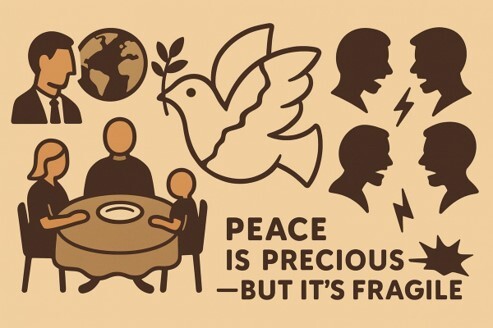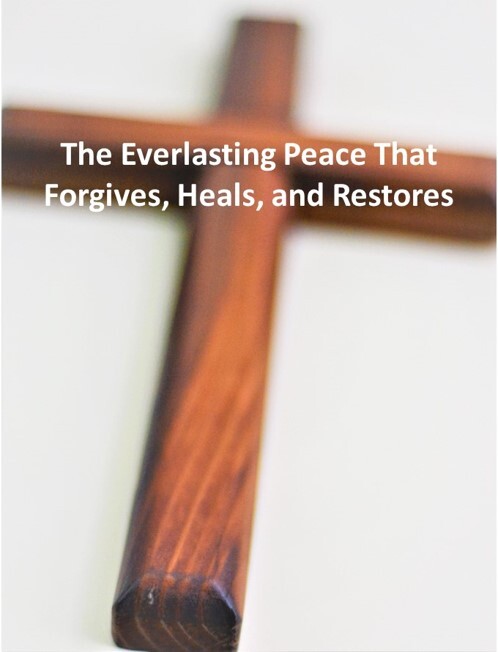Greetings in the name of the Father, the son, and the Holy Spirit.
“The LORD gives strength to his people; the LORD blesses his people with peace.” – Psalm 29:11
Everywhere we turn today, people are longing for peace.
We talk about peace between nations, peace in our cities, peace in our homes, peace in our hearts. We sign treaties, post slogans, and hold conferences for peace—yet somehow peace keeps slipping through our fingers.
It doesn’t take much to lose it. A harsh word, a misunderstanding, a betrayal—and the calm of yesterday becomes the storm of today. It happens in families, among friends, even within churches. Every heart knows the pain of broken peace.
Paul knew that pain too. When he wrote to the believers in Colossae, they were learning how to live as one body in Christ. There were differences—cultural, social, and spiritual. So Paul wrote these words:
“Put on then, as God’s chosen ones, holy and beloved, compassionate hearts, kindness, humility, meekness, and patience, bearing with one another and, if one has a complaint against another, forgiving each other; as the Lord has forgiven you, so you also must forgive. And above all these put on love, which binds everything together in perfect harmony. And let the peace of Christ rule in your hearts, to which indeed you were called in one body. And be thankful.”
— Colossians 3:12–15
This is not merely advice for good behavior. It’s a roadmap for *how peace can last*. Because true peace—the kind that endures—doesn’t come from treaties or silence; it flows from hearts transformed by Christ.
So today we will reflect on three truths about this lasting peace:
1. Peace Requires a Holy Character
2. Peace Endures Through Forgiveness
3. Peace Lasts When Love and Gratitude Rule
1: Peace Requires a Holy Character
Peace is precious—but it’s fragile. You can spend years building it and lose it in a moment. Nations negotiate peace treaties only to watch them crumble over pride, fear, or revenge. Families share meals one day and stop speaking the next because of words spoken in anger. Between friends, one misunderstanding can undo years of trust. Every side feels justified. Every heart claims to be right.
Paul understood this tension. Writing to the Colossians, he didn’t tell them merely to keep the peace—he told them to put on the character of peace.
“Put on then, as God’s chosen ones, holy and beloved, compassionate hearts, kindness, humility, meekness, and patience.” — Colossians 3:12
These are not soft or passive virtues. They are the armor of peace. Without them, peace cannot even begin. The world often believes peace is maintained through power or negotiation. But Scripture says peace begins with character—the reflection of God’s own nature within us.
When Jesus was arrested in Gethsemane, Peter drew his sword and struck the servant of the high priest, cutting off his ear. But Jesus stopped him immediately:
“Put your sword back into its place. For all who take the sword will perish by the sword.” — Matthew 26:52
Then, in one of the most astonishing acts recorded in Scripture, Jesus reached out and healed the man who had come to arrest Him ( Luke 22:51 ).
Imagine that—healing your enemy while your closest friend betrays you. That is holy character. That is peace in action.
To be holy means to be set apart—to respond differently than the world expects. The world says, “Defend yourself.” Christ says, “Love your enemy.” The world says, “Win the fight.” Christ says, “Bless those who curse you.” The world says, “Show strength.” Christ says, “Show mercy.”
It is impossible to build lasting peace with an untransformed heart. Peace cannot live in a soul ruled by pride, envy, or fear. But when we begin to resemble Christ—gentle, humble, patient—peace begins to take root naturally, because His Spirit produces it within us.
Paul reminds us that we are “God’s chosen ones, holy and beloved.” That means our worth is not earned by performance but given by grace. And because we are loved by God, we are free to love others—even those who hurt us. When we clothe ourselves with His compassion, peace stops being something we chase and becomes something we carry.
The peace Jesus gives is not fragile or circumstantial; it flows from holiness. It is the power to remain calm when provoked, to listen when misunderstood, to be kind when wronged. It is the quiet strength He displayed on the cross—when love conquered hate and mercy triumphed over judgment.
“Blessed are the peacemakers, for they shall be called children of God.” — Matthew 5:9
To be a peacemaker is to be like your Father in heaven—to reflect His patience, His gentleness, His love. Peace requires a holy character because it is not just a principle; it is the personality of Christ living within us. When His holiness shapes our reactions, peace begins to last.
2: Peace Endures Through Forgiveness
If peace is fragile, forgiveness is what makes it endure.
Paul writes, “Bear with one another and forgive each other; if anyone has a complaint against another, forgive as the Lord forgave you.” – Colossians 3:13
Forgiveness is not optional; it is essential. Without forgiveness, peace dies young. It’s like a wound left untreated—it festers and poisons the body. Forgiveness is the healing balm that allows peace to live and breathe again.
But forgiveness is hard because it feels unfair. It means letting go of what feels owed. It means choosing mercy when our hearts cry for justice. Yet forgiveness is not weakness—it is one of the strongest acts of faith a human being can ever make. It takes courage to forgive. It takes trust that God sees, God knows, and God will set things right in His time.
Jesus showed us that forgiveness is the heartbeat of lasting peace. Even as He hung on the cross, He prayed,
“Father, forgive them, for they know not what they do.” — Luke 23:34
He didn’t wait for an apology. He didn’t wait for His executioners to repent. He forgave first. Because peace cannot wait until others change—it begins when our hearts yield to God’s mercy.
We see this beautifully in Peter’s story. After denying Jesus three times, Peter was crushed by guilt. The shame must have been unbearable. When the resurrected Jesus appeared to His disciples, He greeted them with the words:
“Peace be with you.” — John 20:19
Imagine how that sounded to Peter’s ears. The one who had failed most deeply was the first to hear Jesus speak peace.
Later, by the Sea of Galilee, Jesus met Peter again—not to condemn him, but to restore him. Three times Jesus asked, “Do you love Me?” and three times Peter answered. With each question, the wound of denial was replaced with the healing of grace. Jesus didn’t erase Peter’s failure—He redeemed it. Forgiveness turned Peter’s guilt into gratitude and his sorrow into peace.
When Jesus forgave Peter, the war inside Peter’s heart finally ended. The man who once ran away now found the courage to stand before thousands and proclaim Christ without fear. That’s what forgiveness does—it turns broken people into messengers of peace.
Forgiveness does not mean pretending nothing happened. It means releasing the right to retaliate. It means choosing mercy over memory. It means letting the peace of Christ rule instead of resentment or pride.
Jesus once told Peter not to forgive seven times, but “seventy times seven.” (Matthew 18:22) That’s not a formula—it’s a lifestyle of mercy. It means never keeping count, because grace doesn’t keep score.
Paul echoes this truth again:
“Be kind and compassionate to one another, forgiving each other, just as in Christ God forgave you.” — Ephesians 4:32
Forgiveness is costly. It costs our pride, our right to be right. But without it, peace cannot survive. When we forgive, we let God heal the wounds that anger and bitterness keep reopening. And in that surrender, peace finds room to endure.
3: Love and Gratitude — The Bond and Climate of Lasting Peace
Paul concludes this passage with two beautiful commands—simple yet profound:
“And above all these put on love, which binds everything together in perfect harmony. And let the peace of Christ rule in your hearts, to which indeed you were called in one body. And be thankful.” — Colossians 3:14–15
Here lies the secret of the longevity of peace: love holds it together, and gratitude keeps it alive.
Love is the bond of peace, the glue that holds every relationship and every virtue in place. Gratitude is the climate in which peace can grow and endure. Without love, peace becomes a fragile truce. Without gratitude, peace fades into forgetfulness.
Love is what holds relationships together when apologies are delayed and understanding feels distant. Gratitude is what reminds us how precious those relationships are, even when imperfect.
Paul says, “Above all, put on love.” Love is the outer garment that ties everything else together. Compassion without love turns into pity. Forgiveness without love becomes obligation. But when love covers all, it transforms our actions into joy.
Love is not a passing emotion—it’s a decision. It’s choosing to seek the other person’s good, even when it costs us something. Jesus modeled that kind of love at the cross.
“Father, forgive them, for they know not what they do.” — Luke 23:34
Even as He suffered, Jesus chose to love. His love was not blind to injustice—it was stronger than it. His love didn’t erase memory—it redeemed it. That is why Paul calls love “the bond of perfect harmony.” It takes what’s broken and holds it together until healing comes.
Love is not passive. It works quietly but powerfully, binding hearts that would otherwise fall apart. It is what makes peace resilient when the world tries to tear it down.
Then Paul adds, “And be thankful.” Gratitude may sound small compared to love, but it is the atmosphere in which peace thrives. Gratitude shifts our focus from what’s wrong to what’s right, from what others owe us to what God has already given.
“Give thanks in all circumstances; for this is the will of God in Christ Jesus for you.” — 1 Thessalonians 5:18
A grateful heart remembers grace instead of grievances, blessings instead of burdens. It sees even small mercies as miracles. When we lose gratitude, peace grows cold; we begin to count offenses instead of blessings. But when we practice thankfulness, our hearts become fertile ground where peace can grow again.
Imagine a fire on a cold night. The flames give light and warmth, but only if the logs stay close together. If one rolls away, it soon turns cold. Love keeps the logs together; gratitude keeps the fire burning. When pride or bitterness separates us, peace fades. But when love and thankfulness draw us close, warmth returns—and peace lasts through the long night.
Jesus lived this perfectly. Before raising Lazarus, He prayed, “Father, I thank You that You have heard Me.” (John 11:41) Before facing the cross, He gave thanks and broke bread. His final acts were love and gratitude—and through them, peace was secured forever.
So when Paul says, “Let the peace of Christ rule in your hearts,” he means: let peace be the umpire of your emotions, the guide of your words, and the ruler of your relationships. The world offers peace built on fear or silence; Christ offers peace built on love, sustained by gratitude, and kept by His grace.
“And now these three remain: faith, hope, and love. But the greatest of these is love.” — 1 Corinthians 13:13
Where love reigns, peace endures. Where gratitude abounds, grace multiplies. And where Christ rules, the heart truly finds rest.
Summary: The Longevity of Peace
So, how does peace endure?
It begins with holy character—a heart softened by compassion, guided by humility, strengthened by patience. It continues through forgiveness—the courage to let go, to release others as Christ has released us. And it lasts through love and gratitude—the two wings that keep peace soaring high above the storms of life.
Peace is not the absence of conflict; it is the presence of Christ.
He is the compassionate one who bore our griefs,
the humble one who knelt to wash our feet,
the forgiving one who restored our souls,
and the loving one who binds us together in perfect harmony.
When His character fills our hearts, peace no longer depends on what happens around us—it flows from who reigns within us. It is not fragile; it is eternal, because it is His peace, not ours.
Paul’s blessing still echoes across time:
“And the peace of God, which surpasses all understanding, will guard your hearts and your minds in Christ Jesus.” — Philippians 4:7
When Christ rules within, peace lasts—not because life becomes easier, but because our hearts become anchored in Him.
Let His peace guard your words when you are hurt.
Let His grace renew your hope when you are weary.
Let His love hold your relationships when they strain.
Then, like Peter after his restoration, like Paul writing from prison, and like Christ forgiving from the cross, you will find that peace endures—quietly, faithfully, eternally—because it lives in the One who never changes.
And that peace, once received, is meant to be shared to live in the hearts of many,
Let’s pray together.
Heavenly Father,
We thank You for the gift of peace—
not the peace the world gives, but the peace that comes through Your Son.
Teach us to clothe ourselves with compassion, kindness, humility, and patience.
Teach us to forgive as You have forgiven us.
Fill our hearts with love that binds and gratitude that endures.
When we are tempted to fight, remind us to make peace.
When we are wronged, remind us to forgive.
When we are weary, remind us to be thankful.
Let the peace of Christ rule in our hearts,
let His grace renew our minds,
and let His love bind us together as one body.
In Jesus’ name,
the Prince of Peace,
Amen.
“Now may the Lord of peace himself give you peace at all times in every way. The Lord be with you all.” — 2 Thessalonians 3:16





